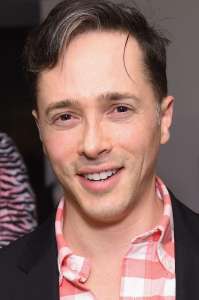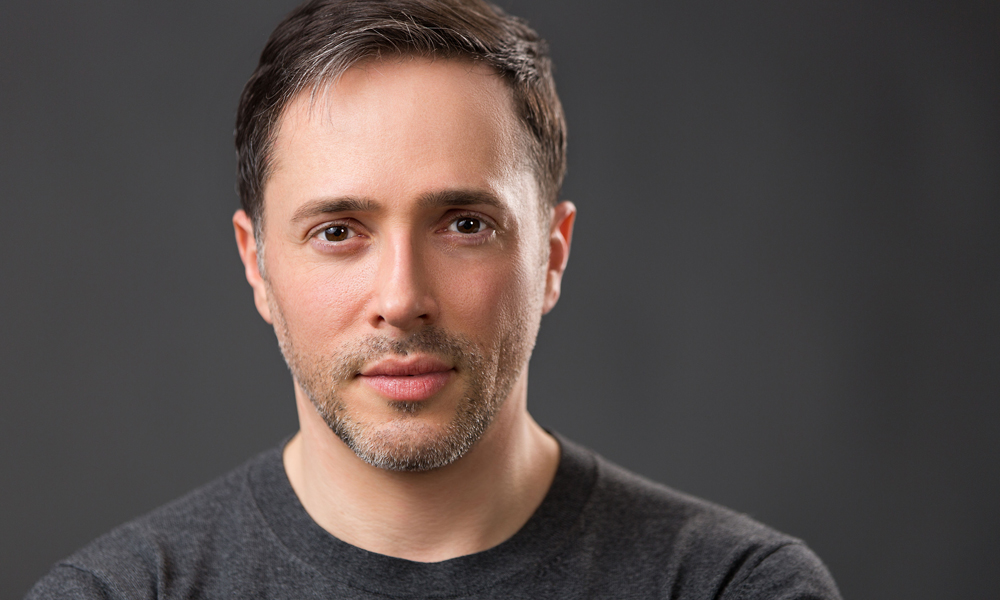When most of us hear the term “religious,” we think of sheitels, shtreimels, and what we can’t do on Shabbos, which is why most of us aren’t “religious” or “that religious.” However, Yuval David, an actor, filmmaker, and activist, is reclaiming what it means to be “religious” as I learned in our recent conversation.
Yuval’s IMDB page can give you his professional background. I was more interested in his personal background and the forces that shaped him into the person he is. Yuval grew up in the D.C. area with frequent jaunts to Israel to visit his grandparents.
YD: I would spend most of my summers and winters in Israel. …My Israeli experience was surrounded by family primarily between the cities of Ramat Poleg near Netanya and Kfar Saba, land that my family had developed for many, many generations, as well as Jerusalem and Tel Aviv. … My [maternal] grandparents are Holocaust survivors. On my biological father’s side, my grandmother, [Yona Blass Bienenstock] fled Poland right before the war and my grandfather [Yosef Bienenstock] was born and raised in Israel on the same farmland that my family had for many generations. On my paternal grandfather’s side, [Menachem and Hadassah Nordstein] had fled the pogroms of Russia and came to the only land that made sense for them to go to and started to buy land wherever they could. But they could only afford land that was mostly rocks and dirt, so they started figuring out ways to irrigate, bringing water to it and developing one of the agricultural centers in Israel, Kfar Saba. So, my grandfather was said to be the best farmer, living and breathing with the trees and the dirt and the ground and the fruit that was grown on the trees. He was a remarkable man.
EGT: Wow. Tell me about your connection to the land. I think a lot of people accept that Israel exists but — at least outside the Jewish community — don’t really understand why Israel needs to exist.

YD: Israel needs to exist because it’s part of Jewish culture and identity and religion. Every prayer book has prayers about the Land, even about rain falling on the Land. The Jewish texts that have existed for thousands of years, and the Jewish traditions, have so much that is about the land. It is virtually impossible to take that land out of Judaism…. We are in an era where there is this rebranding of Jewish identity and that can be very dangerous. For example, [some] people are rebranding Zionism. Zionism is an inherently Jewish concept that was developed in the 1800s because it got to a point where Jews recognized that Jews need socio-political representation because no one would represent us as well as we can represent ourselves and that’s the only way we can protect ourselves. And it took the whole concept from Judaism, from Jewish thought and identity. So, I find it very hard to separate Israel from my Jewishness.
EGT: Were you brought up in a particularly religious home, or was it more of a Theodore Herzl Zionism?
YD: I was not brought up in a particularly religious home, yet religion definitely played a role. My grandfather, Yosef Binenstock, who is a recognized hero and survivor of the Holocaust, came from an ultra-ultra-ultra-orthodox Jewish family. He could quote anything from the Bible, any pasuk from Gemará and break things apart and talk about them. But, when he was a child, before he was taken into the camps, he cut off his payos because was tired of getting beaten up in the streets of Wadowice in Poland. During his experience in the camps where he lost the vast majority of his family and friends, he just couldn’t imagine a G-d who would allow that to happen. So, he definitely did not live a religious life, but he knew all of the tunes and the prayers and could have those conversations.
My maternal grandmother, who was one of the most beautiful people I have ever met, just a good-hearted soul who could find the positive in everything, she was this über-Zionist who thought we must do everything we can for Am Yisrael Chai, so that the Jewish people continue. At the same time, we must do all we can to help all other people who are in need because that’s what it means to be Jewish. That’s truly how she lived every breath. She understood the hardships because she also lost almost all of her family and all of her friends. She witnessed such horrors that she had to lean on hopefulness for her own mental health. … She had an expression that she would use often, especially if I was having a hard time as a kid: “Behind every storm cloud, the sun is still shining.”
… My paternal grandparents were definitely not religious. [Yosef] worked the land as a farmer. He would wake up before sunrise to tend the orchards… He was also very connected to the land and the people and he fought to protect the land and his family. … He also had very close Arab friends from childhood. It was a very hard thing when Arab leadership forced them to not be friends anymore, even though they wanted to be. There are some really harrowing stories when Arab leadership told them not to be friends with Jews or else. But they grew up together. They lived together and farmed together, and then they were told they couldn’t be friends anymore. And that’s part of the story that’s not told too often at least in history books.
EGT: It’s going to get told in this article, I can tell you that.
YD: Israel is a region that can really tell a lot about the detriment of political systems and negotiating with non-democratic political entities. Then, my paternal grandmother was an author and a poet. Even though she lived on an orchard, she liked to have long gloves. She was very into literature and music. She was a Tel Aviv lady who ended up moving to the farm kind of like an Israeli Green Acres. … So that’s a long answer to your question: Was my family religious?
EGT: That’s a great answer.
YD: … I have a mission to take back the term “religious.” Because so many times, when we hear the word religious, we think of beards and payos and strumelach and all of these things. So, I’m a very spiritual person. I’m a Humanist, but my Humanism is very intertwined with my Judaism. I might not go to synagogue every week and study the Torah every day, but I have studied the Torah and the Talmud. I can have the debates and chevrutas. I can do all of those things and I’m very aware of those things. … I think the beautiful thing about Judaism is that it allows us to question what being religious means. Judaism is a religion, but it’s also a culture, a nationality and a race. And it’s an -ism, it’s a movement. In a recent [inter-faith] panel discussion that I was a part of, we were speaking of what the ultimate point of different religions are. I spoke last and I said, “I’m hearing these people speak a lot about Love. Judaism isn’t about Love. It’s about Justice. “Tzedek, tzedek tirdof. Justice, Justice, you shall pursue.” (Deut. 16:20) So, if we spend our lives pursuing Justice, are we being religious?
EGT: Something that really caught my eye about you is your work in LGBTQ advocacy in Afghanistan.
YD: … Advocacy is my role as a Jew in this life. If I am to help the Jewish community, I must also help other people. That inspired my LGBTQ advocacy. And I can’t just advocate for LGBTQ people in the USA and Israel, I must help people internationally. The LGBTQ are the most diverse community in the world because we happen to be a part of every community in the world. So why wouldn’t I advocate on behalf of LGBTQ Muslim Afghanis?
EGT: So, what did you do? Did you go to Afghanistan or was it more of an advocacy from afar?
YD: Advocacy is advocacy from afar. I wrote articles that got published in LGBTQ publications in the United States and abroad. I created video content telling these stories because I wasn’t hearing these stories. It became important for me to create an advocacy series. … I have a platform where I can use my work as a form of representation. So, I wanted to create content to report on under reported news stories. I said, “What happened to LGBTQ people in Kabul?” I was researching and found all of these horrendous stories.
When the US and others left Afghanistan, they took out many of the people who worked with them. They took out the Women’s Rights activists and I said, “What about the LGBTQ activists?” Some of the videos that I created were shared on WhatsApp and ultimately reached Afghanis who then reached out to me asking for help. Now I needed to directly help them, not just tell their stories. That led to meetings with senior advisors on LGBTQ affairs to the White House and the State Department. I was recently named an Organizational Ambassador for the Rainbow Railroad, which helps evacuate LGBTQ people in dangerous situations around the world. There are 1,600 documented cases of LGBTQ people still in Afghanistan who are trying to get out. I have found asylum for 23 people so far. Talk about the Jewish principle of saving a life and saving the world. That’s more meaningful than anything else I’ve done.
Whatever you can imagine of how horrible their stories are, it’s worse. Gay men get raped on a daily basis as punishment for being gay. … Lesbian women are raped or sold off into slavery. There was a 14-year-old girl who I was interfacing with for many months. She fled to Kabul to live with her cousin who was her best friend. We were trying to get her out because her parents wanted to marry her off to a man 47 years her senior and she didn’t want to do that. She knew that she had what she called “lesbian tendencies.” And we set up a transport for her to get her out, but the day before that, her parents found out where she was. … They kidnapped her, stripped her naked and paraded her through the streets, poking her with prongs. They buried her in a hole up to her neck and it was her own mother who threw the first stone at her head….
I have horrible stories like that of people getting punished for how they love and who they love. As an LGBTQ advocate, I can’t only advocate for progressive people in America and Israel. I must advocate for all people. … That’s what makes me “religious.” My advocacy makes me religious, following the concept of Tikkun Olam, repairing the world, Tikkun Hanefesh, repairing lives, makes me religious.
Yuval David is a very talented actor and filmmaker, but more than that, he is a deeply passionate mensh, giving a voice to the silenced and offering refuge to the endangered. You can learn more about his advocacy on behalf of the LGBTQ+ in Afghanistan here and here. For more information on the work of the Rainbow Railroad, click here.
Republished from San Diego Jewish World


























